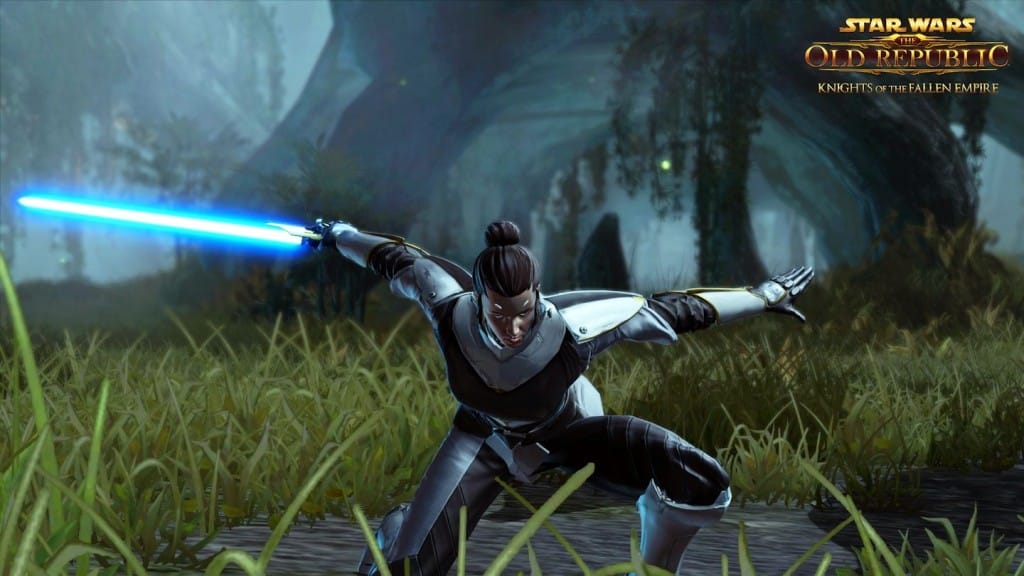The Chiss were a tall, blue-skinned Near-Human civilization from the Unknown Regions, best known as the people to which Grand Admiral Thrawn belonged. Due to the remote position of their home territory in the Chiss Ascendancy they remained largely an enigma to the rest of the galaxy, and contact with outsiders was limited even in the days of the Galactic Alliance.
Overview
The Chiss were marked out from the majority of mainstream galactic civilization by their height, pure blue skin, gleaming black hair, and glowing red eyes. Physically striking and instantly recognizable, and armed with a typically cool and disciplined manner, the mystique of the Chiss was further increased by the remote location of their territory in the Unknown Regions beyond the Outer Rim. However, this remoteness also meant that they were largely disconnected from the galaxy-spanning nexus of hyperspace travel and subspace communications that bound together the Old Republic, Empire, and New Republic in turn, and thus detached from the associated pan-galactic networks of economic, cultural and political contacts.
There is, in fact, evidence that intermittent, clandestine and low-level encounters between the Chiss and groups within the Old Republic had been ongoing for perhaps four millennia prior to the era of the Galactic Civil War but these encounters left no visible, lasting impression on the galaxy as a whole, and the isolation of the Chiss can be gauged by the fact that they remained largely unaware of standard languages such as Huttese and Basic, with communications with outsiders being conducted instead through local trade-languages such as Minnisiat.
The pace of contact began to accelerate shortly before the Clone Wars, but it was only after the Battle of Endor that the Chiss became visible for the first time on the wider galactic stage — largely due to the rise to prominence of the exiled warrior named Thrawn, a military genius who became the only non-Human Grand Admiral in the Imperial Starfleet.
Thrawn’s own Household Phalanx was personally loyal to him and his ideals, and allied with the Imperial forces that he brought to the Unknown Regions — the faction that came to be known as the Empire of the Hand. The Chiss Expansionary Defense Fleet served the Chiss Ascendancy, which had exiled Thrawn in around 20 BBY for breaking its strict codes of military conduct, and which apparently commanded the loyalty of the vast bulk of the Chiss population.
The frequent confusion between the C.E.D.F. and the House Phalanx was just one indicator of how little the wider galaxy knew or understood about the Chiss. Although Thrawn’s fame ensured that they rapidly became one of the most iconic and instantly recognizable of all non-Human peoples, much about them remained mysterious to Galactic civilization at large, even as the Unknown Regions began to be opened up in the age of the Galactic Alliance.
Biology and appearance
The Chiss and baseline Humans regarded each other as aliens, but genetic studies have indicated that the two peoples were close biological cousins, and it is not clear whether the differences between them were the product of straightforward evolutionary divergence and differing planetary habitats, or the result of genetic engineering similar to that which produced such hybrid species as the Massassi and Myke.
Outwardly, the Chiss were distinguished from baseline Humans by three clearly visible traits — blue skin, midnight-black hair, and glowing red eyes; but their blood was red. It is possible that these superficial features were the result of external factors in the biosphere of their ice-locked homeworld Csilla. Their coloration was said to be caused by the same atmospheric minerals that gave Csilla’s glaciers their distinctive bluish tinge, and while less is known about the reasons for their distinctive glowing red eyes, an environmental reaction does seem to be involved, as Chiss eyes were observed to glow more brightly in more oxygenated atmospheres.
Beyond these potentially superficial differences, it is not clear how far the Chiss diverged from Human norms. Although both Chiss and Humans speculated about distinct physiological differences, for instance in the vocal apparatus or skeletal structure, there is no firm proof of stark evolutionary differences. One theory put forward is that the Chiss were in fact descended from an ancient group of Human colonists who settled in the Unknown Regions long before the foundation of the Galactic Republic and were subsequently forgotten. There was, in fact, a Human sleeper ship colony established on Csilla around 27,500 BBY, though records of this were virtually nonexistent and it remained unknown how a remote area of the galaxy could have been trailblazed so far back. It does seem that the Chiss possessed a faster-than-average metabolic rate, leading to a distinctively lean physique and maturity considered reached at around age ten or twelve.
Society
Even in the era of the Galactic Alliance, the wider galaxy seems to have had no direct contact with Chiss civilians. What was known about them was, as mentioned above, they mediated largely through encounter with military units, and through a few high-level contacts with political and diplomatic delegations. It is perhaps no surprise, then, that the military and the ruling class were the best understood aspects of Chiss society; or at least, the best documented.
The Ruling Families
Much of the political power within the Ascendancy seems to have rested with a group of affiliations known as the Ruling Families (or sometimes “Ruling Houses”), which seem to have had features of both lineage-groups and specialized castes, and who between them provided leadership for the Chiss in all aspects of society.
One level, the Ruling Families were, as their name suggests, defined by blood relationships; but while lineage undoubtedly played an important role in the structure of the Families, merit also had a part in defining membership. Formal processes of advancement existed by which commoners could achieve status in the Family hierarchy. A study of Chiss society produced by the University of Sanbra in the last years of the New Republic claims that the Family lineages stretched the length of Chiss history and spanned the breadth of the Chiss population, so that every Chiss was associated with a Ruling Family; but if this is correct, the mechanisms of advancement make it clear that there was a division between those who were actual members of the Families, and those commoners who were merely affiliated to them.
The best-documented means of acquiring Family status through merit was that which operated in the military. For the duration of their service, every officer in the Chiss military was attached to one of the Ruling Families as a “merit adoptive”, and while under normal circumstances, this Family status was lost when an individual left the service, those of particular ability were said to be “born to trial”, and given the opportunity to make their Family status permanent.
If these Trial-born of the Family were successful, they would be permanently “matched” to the lineage; conversely, members of a Ruling Family could apparently also be “released” and “rematched”, although it is even less clear how this processes operated. It is possible that marriage was involved in matching, although no mention is yet known that indicates an institution of marriage among the Chiss.
There was a hierarchy of leadership within each Family, consisting of brothers and sisters (known collectively as siblings), plus cousins, and ranking distant relations—the last being the highest level that the most able Trial-born could reasonably hope to achieve. Individuals with the ranks of Aristocra and Syndic also served as high-level representatives of the Families, with seemingly plenipotentiary powers, though an Aristocra could hold only collateral rank within the internal hierarchy, and a Syndic at least could be Trial-born.
Government structure
Given the caveats noted above, it is perhaps best to treat the rest of the University of Sanbra material on Chiss government with some caution, in emphasis if not precisely in content. The report claimed that the twenty-eight colony worlds were led by “appointed governors, or House leaders”. Perhaps unsurprisingly, it is not entirely clear whether this phrase signifies one group or two: the Sanbra information says that they were all elected in a “democratic” manner, but other evidence suggests that the Ruling Families had significant authority in at least some colonies, and the title of House leader suggests at an association with the quasi-dynastic Families (especially as they are called Houses in the Sanbra material). Whatever the case, it but it seems that the planetary leaders held executive authority on their own worlds—for instance, House leaders “usually” appointed the commanders of the Colonial Phalanxes—and they also came together to form the Chiss Parliament, sitting in a building known as the House Palace, located on Csilla in the capital city of Csaplar (the name of which seems obviously related to that of House Csapla).
Insignia of the Chiss Ascendancy
Culture
One major problem caused by the distance which the Chiss keep from outsiders is the relative paucity of evidence for their culture outside of the fields of language, society, and military culture.
One feature that can be noted is the distinctive Chiss mode of dress. The Chaf family and their retainers wore yellow, adherents of the Mitth and Nuruodo affinities may have worn shades of red, and the Csaplar, Sabosen and Inrokini families apparently dressed in gray, bronze and green. The quantity of color also denoted status: black, perceived as a combination of all the colors, served as the base color of military uniforms, and a neutral gray backing was used on the formal dress of civilian House representatives like an Aristocra or a Syndic. Garments were also tailored from an asymmetrical patchwork of subtly contrasting textiles.
As alluded to above, at least some elements in the Chiss military are known to have prized a warrior ideal known as the “Red Flame”—a combination of courage, discipline and cunning; and this is an ideal that, at first glance, Thrawn could also be said to have embodied. But such values have been traditionally common to many military organizations, and the practical demands of military discipline in the armed forces do not in themselves require a philosophical collectivism in mainstream civilian culture.
One observed cultural trait that does seem to have had a wider cultural cachet is a stress on conformity and consistency. There are hints at a social structure stratified to the point of frigid immobility, suggestions that traditional ceremony and polite behavior were regarded as important factors in ensuring social stability, and, more clearly, evidence for a culturally-predicated reluctance to acknowledge change or difficulty.
The opposition to preemptive strikes was, however, an issue on which Thrawn disagreed emphatically with convention; and it may not be over-emphasizing the contrast to further note that where the ethos of the CEDF placed a firm stress on self-restraint, obedience and success, placing these qualities ahead of individualism, inspiration and commendable effort, the Grand Admiral is known to have encouraged personal initiative and rewarded creative thinking even when the outcome was less than perfect success. Moreover, where Thrawn showed a keen interest in understanding the unique cultural, aesthetic, and ideological traits of alien species, more traditionalist Chiss seem to have regarded the distinctions between Chiss and non-Chiss as insurmountable.
The contrast between Thrawn’s followers and traditional orthodoxy can be seen more clearly if we consider the early career of Jag Fel, one of the few non-Chiss to have served with either the CEDF or the House Phalanx (and at times an officer with both). As noted in the previous section, political reasons led to Jagged being trained and commissioned as an officer in the Ascendancy’s military arm, but while expediency made it necessary for the Chiss to tolerate the presence of a Human in their ranks, the actual concept of his being there was akin to a joke in questionable taste.
Jag’s subsequent departure from the Ascendancy to join the House Phalanx is unlikely to have represented an enthusiasm for Chiss tradition; but he did not leave the wider frame of Chiss culture: he continued to fly and fight with Chiss pilots in the House Phalanx, surpassing their standards of excellence and earning their respect and allegiance to the point that his squadron elected him as their commander. While capable aliens might earn the personal and professional respect of those Chiss who had the opportunity to work directly alongside them—as Jag had done with Shawnkyr Nuruodo, and as his brother Chak Fel did with General Drask—it would seem that the Phalanx was more open to acknowledging outsiders than the CEDF.
Baron Fel’s son did not embrace the culture and values of the Chiss Ascendancy; indeed, conventional Chiss wisdom regarded it as impossible for an alien to do so. Rather, Jag saw himself as specifically motivated by a loyalty to Thrawn’s legacy and ideals, and in his eyes, these were centered on a military independence from political concerns, and a high-minded belief in the proactive use of force in defense of moral ideals.
What is certain is that, whether due to abstract principles, specific circumstances, or a megalomaniacal personality cult, Thrawn commanded the impassioned loyalty of his followers and allies, Chiss and non-Chiss alike, a devotion comparable to that inspired by some of the worst dictators and greatest leaders in known history. It is hard to quantify the effect of such a figure on a society, and no schematic explanation is likely to adequately express it. Thrawn’s influence is a reminder not only that Chiss culture was broader than the glacial monolith of orthodoxy, but also that, while across a species—or culture—specific factors such as language, ideology and conceptual framework may bind people together into cohesive groups, other elements are at work, such as personal charisma and inspiration, which simply transcend the differences and definitions that people think of as defining themselves.
As a people, the Chiss were intelligent as well as highly valuing their privacy. This extreme protection of their society was what allowed them to remain hidden from the rest of the galaxy for so long. They were described as being pensive as well as contemplative, deliberate and calculating. This meant that they often studied situations from many different viewpoints. As such, they considered all alternatives to a situation and even noted down scenarios on what would have happened if they had made a different decision. In combat situations, Chiss acted both calmly and intelligently as well as formed well planned strategies. In terms of personality, they often displayed a cold, arrogant and disciplined behavior.
Amongst the Chiss, there was no period of adolescence as their children matured early and were given adult responsibilities very quickly. Scientists believed that they essentially bypassed the adolescent stage and reached maturity quickly. By the age of ten, they were ready to join military service and wear cadet uniforms. The species were highly reserved in their emotions and often did not display feelings openly; either by smiling or by warm gestures. As such, they rarely were vocal about any feelings of anger or frustration though they did possess some curse words to employ should the situation warrant such an expression. Though this was the impression projected, the Chiss were also a thoughtful people. While they were deliberate and calculating, they were not above wondering about how certain events might have turned differently had circumstances been altered. In fact, whenever a Chiss suffered a setback or even a defeat, they often contemplated what might had been done differently in order to ensure that a victory was achieved in the next engagement. Chiss were noted for possessing an unparalleled aptitude for tactical thinking. The ideals of the Chiss were idolized in the form of the Red Flame.
Their society was highly structured and ordered with the rule of law being enforced by the ruling families. These were not biological family groupings but instead different branches of their government. As a general rule, Chiss did not take part in any action that would bring shame on their house with entire family lines exiled due to the actions of a single member. They also did not celebrate until their duty was completed as any celebrations made before such an event were considered false. Despite this, they were highly committed in their duties and a Chiss warrior if given an order would carry it out even if they disagreed with it which highlighted their belief in the chain of command. It was also known that the Chiss as a culture had an aversion to suicide and expendability as they found those actions to be wasteful. Though this was the case, there were occasions where Chiss gave their lives rather then surrender. In such circumstances, this was either due to the importance of the strategy for their people or because surrendering to a certain foe was considered a fate worse than death.
The Chiss had a keen interest in art and science and were skilled in mathematics. Their thought processes were based around a logical mindset which meant that they were interested in philosophy and in learning about other cultures. On the other hand, they were also xenophobic and any knowledge they gained from other cultures was used as a means of gaining a advantage over a potential foe. One notable group of individuals that were involved in deep contemplation were Chiss sages who studied the threat of the Yuuzhan Vong and concluded that the extragalactic invaders must had spent countless generations traveling through the void between galaxies. This clinical detachment was similar to how a biologist studied an insect which was how the Chiss view their foes and they often engaged in extreme caution in such circumstances. When among non-Chiss, individual members of the race were often aloof and pensive as they plotted tactics which would ensure a victory if a confrontation were to occur. Chiss never truly lost their xenophobic instincts, even when they were amongst members of other species for long periods of time. Despite this xenophobia, they were at times willing to accept members of other races into their ranks so long as they proved to be exceptional as well as trustworthy individuals. Ultimately, the Chiss were considered an honorable people who did not kill more than they thought was necessary to accomplish their goals. However, they were not above using biological weapons of mass destruction against a foe should it be felt that their survival was threatened.
It was believed by many xenosociologists that the rigid and disciplined nature of Chiss society stemmed from their cold environment on their homeworld. They were noted for displaying no signs of decadent or greedy behavior and thus it was concluded that any signs of colonial expansion were mostly due to the Chiss desiring to put order onto chaotic locations. In addition, they believed firmly in the chain of command as well as positions of authority. In fact, Chiss were taught to respect the position itself rather then the person holding that title. As such, Chiss often responded when an individual called out the rank rather then their name.















